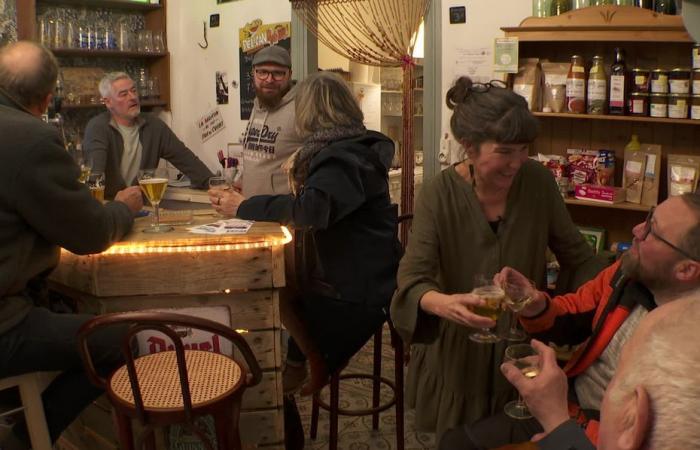
Coffee, gambling, lunchtime restaurants… Bistros and cafes are the markers of French culture. The Ministry of Culture announced on September 27 their entry into the French intangible cultural heritage. In the towns and villages of Nord-Pas-de-Calais, these bars are great places for conviviality.
Company
From daily life to major issues, discover the subjects that make up local society, such as justice, education, health and family.
France Télévisions uses your email address to send you the “Society” newsletter. You can unsubscribe at any time via the link at the bottom of this newsletter. Our privacy policy
“Can I give you two packs of cigarettes?”says Dominique Foulon, owner of the tobacco bar Le Royal in Bruay-la-Bussière (Pas-de-Calais). Hot drinks at the counter, scratch games, newspapers, at any time, that’s what the regulars of this establishment come for.
Since Friday September 27, 2024, bistros or cafes like that of Dominique Foulon have been classified as French intangible cultural heritage. This art of living, unique in the world, has just been recognized in order to be protected.
“People come here to create social connections and to cheer themselves up with a coffee”confides the 58-year-old manager. It is precisely for the “human contact” that the manager of the tobacco bar left his former position as a teacher in 2015. The mood is not always good on the merchant’s side. “At the moment, times are difficult, we are holding on. People have changed the way they consume since covid,” he says.
Registration as an intangible cultural heritage, the assurance of safeguarding the 40,000 cafes and bistros that remain in the towns and villages of France? For Audrey Parent, who took over the café two years agoElisha in Anor (North), the answer is yes. “On is the last soul in the village. Today there is only one café left, before the Second World War there were around fifty here.”
Audrey is a former supermarket employee, her husband worked as a butcher-delicatessen-caterer. At the cafeElishaopen all day, the atmosphere is family-friendly. Passing or loyal customers come for lunch, Caen-style tripe or chicken waterzoï, at affordable prices. “In the afternoon, some customers even play belote”says the manager.
The “conviviality”the DNA of cafes and bistros, according to the inventory sheet of intangible cultural heritage in France, 22 pages long. “We go to the café to meet notable personalities. The managers often know everything about village life”explains Julie Patte, sales representative for a brasserie, who visits cafes and bistros in Nord-Pas-de-Calais. “Each establishment is unique in its atmosphere. Our region stands out for its culture of estaminets, a popular café-restaurant typical of French Flanders. In this type of place, on the program: generous meals, unlimited beer and Flemish games.”
“One thing is certain, Nord-Pas-de-Calais is not left out in terms of cafes and bistros”assures Alain Fontaine, president of theassociation for the recognition of the art of living in bistros and cafes in France.
The Parisian restaurateur, for six years, has been fighting for the inclusion of cafes and bistros in the inventory of French intangible cultural heritage. His observation: cafes and bistros disappear. According to INSEE, there were 500,000 in 1900 against barely 40,000 in 2024. “Deruralization and deindustrialization have caused many cafes and bistros to close”analyzes Alain Fontaine.
We must do everything to avoid the closure of cafes, especially in our villages.
Alain Fontaine, president of the association for the recognition of the art of living in bistros and cafés in France
“We must do everything to avoid the closure of cafes, especially in our villages.” Help with recoveries or transmissions, re-establishment of the mention “bistro-café” at school, conferences or even exhibitions, Alain Fontaine’s association aspires to make “the visible art of living.” If today these proposals are still in the embryonic stage, bistro and cafe owners hope that the inclusion of their workplaces in the French intangible cultural heritage will perpetuate their profession. The file will be submitted for recognition by UNESCO.





